Forgiveness is my next iteration of gift giving, though I give it more to myself. To that gift, I wish to add another — the gift of partnering. No, I’m not talking about an eternal companion (although I don’t object to such “gift giving”). I’m talking about partnering with the Lord. Is there any better time than Christmas to partner with Him? Is there a better way to celebrate Christ than to commit or recommit oneself to the road of discipleship? With Christmas just around the corner, ‘tis the season to partner. Approach holistically Partnering with the Lord has been a longstanding theme of Joy in the Journey Radio. Christ is the source of all true joy, so how can we maximize the joy in our journey without Him? And the best way to include Him is to partner with Him. That partnering includes everything in life, not just the spiritual aspect. Christ’s work is “to bring to pass the eternal life and immortality of man” (Moses 1:39), which clearly has a spiritual component but cannot be complete without also including the emotional, mental, and physical aspects as well. Partnering with the Lord takes life to a whole other level when approached holistically. And why shouldn’t it be so? Christ is interested in every aspect of our lives and blessing us in any way He can. If we partner with Him, He’ll want to help us thrive and succeed emotionally, mentally, and physically as well as spiritually. Thus, partnering with Him means involving the Lord as a full partner in the emotional, mental, and physical aspects of our lives as well as the spiritual. Involve completely Unfortunately, far too many think of partnering with the Lord strictly or primarily in spiritual terms; involving the Lord in the other aspects of their lives means primarily asking for help. They struggle with employment prospects, for example, and so ask for help in finding a job. Asking for help is of course good. But partnering means more than just asking for help. It means counseling and involving in decision making. So instead of asking for help finding work, for example, partnering with the Lord means discussing how to approach your job search, sharing your successes and your challenges, and seeking His input as you decide what actions to take next. Alma the Younger counseled his son Helaman, “Counsel with the Lord in all thy doings, and he will direct thee for good” (Alma 37:37, emphasis added). Involving the Lord in the spiritual aspect of our lives and heeding His direction will of course bring us closer to Him. Heeding His instructions regarding the emotional, mental, and physical matters of our lives as well as the spiritual will bring us all the more closer to Him. But He’s less likely to provide that direction when we don’t involve Him in those matters. Celebrate meaningfully And what better time to involve Him than the Christmas season? In the holy trinity of holidays, we start with gratitude at Thanksgiving, then celebrate the hope for new life we have because of the birth of that new life in the manger, and conclude by resolving to act better in the new year. Partnering with the Lord in every aspect of your life is a wonderful way to celebrate the reason for the season. That celebration will be most meaningful if it leads to actions that produce positive results. Many holiday traditions are simply rote performances; you do them because it’s that time of the year. But rote performance doesn’t change you. The richer celebration is one that leaves you changed, and truly partnering with the Lord will do just that. If you are not now partnering with the Lord in every aspect of your life, now is a great time to start, for ‘tis the season to partner. Make partnering with the Lord your new Christmas tradition. When you do, He “will direct you for good.” And that will bring you more joy in your journey.
0 Comments
Put the Lord first  Understandably, the weight of life presses on us all. For many LDS singles who’ve lived years without the righteous blessings they desire, that weight can be heavy indeed. A pessimistic outlook on the future that often attends that weight doesn’t help. But there is always hope because there is always Christ. He can help us go forward when we feel there is no way forward because He is the Way. When we give our heartfelt all to Him, He gives us access to His power. And with His power, we can do all things. That includes maximizing our joy in LDS singles life. We can find balance amongst all the tensions of life when we put the Savior and our discipleship to Him first and give our all to Him and His work. As Elder Uchtdorf explained,
This is how LDS singles can move their lives forward. Find a new approach This doesn’t mean your solution to the challenges of LDS singles life is more church. The solution is more you. When you give more of yourself to what you do, you create the space in which you can have more joy in your life. It’s that giving more of yourself that actually creates that space for more joy. That’s why time and time again I’ve defined happiness as giving your all to all the right things for you. That’s why for years I’ve encouraged LDS singles to embrace a personal ministry. Like the widow’s mite which Elder Uchtdorf referenced to begin his remarks, your contribution to making the world a better place is worthwhile when it represents your all because it’s only in giving your all that you become a better you. I can understand why so many LDS singles want to give up on their lives. Dating often results in frustration and other negative emotions. Then there’s loneliness. And those singles who are also parents have double duty in raising their children. I get it. But I also get that frustration is a sign you’re going about something the wrong way. So when you feel life isn’t working right, it’s really you that isn’t working right. You need a new approach! Elder Uchtdorf explained how putting the Lord first helps us each find the new approach we need.
Just keep moving forward When you partner with the Lord by putting Him and His work first and then taking counsel from Him, He Who is the Way will show you the way. This principle works in every aspect of life, not just discipleship. When you give more of you to all you do, you can get more out of what you do. So if you aren’t getting what you want out of dating, give more of you to it. Start by learning the fundamentals. If you aren’t getting more of what you want from your occupation, give more of you to it. And so it goes for every aspect of life. You can find the balance and lift you need when you give your all and keep moving forward. So don’t stop. Don’t stagnate. Don’t wallow in the mire of despair. Don’t wrap yourself in pity. Focus on where you want to go and keep moving forward. As Elder Uchtdorf taught,
Give your heartfelt all to all you do. You’ll create the space for more joy in your life. You’ll see life turning around for you. And you’ll find more balance and lift in your life as you come closer to the Lord. And that will bring you more joy in your journey.
But I also had a conversation with my PhD advisor, who wants to see much more out of me. That experience led me to reflect on what I have in my life and more importantly why. Reassessing the different elements in my life somehow brought me to President Nelson’s remarks from the last General Conference entitled “Make Time for the Lord.” In this address, President Nelson shared three ways in which we can make time for the Lord. Focus on the Savior  The first time we should make for the Lord is to fix our focus on Christ. President Nelson declared, “Nothing invites the Spirit more than fixing your focus on Jesus Christ. Talk of Christ, rejoice in Christ, feast upon the words of Christ, and press forward with steadfastness in Christ.” In my recent reflections, I’ve wondered how much of my focus is fixed on Christ. How often do I talk of Him? How often do I rejoice in Him? How often do I feast upon His words? How often do I feel the determination to press forward with steadfastness in Him? I’ve focused my scripture study this year on success and the path to prosperity. My study hasn’t yet concluded, but it’s already abundantly clear lasting prosperity comes as God’s blessing upon those who embrace true principles. This conclusion encourages us to follow the Prophet’s counsel to fix our focus on Christ. Later this month I’ll pivot my scripture study towards my annual tradition of studying the Sermon on the Mount to increase my discipleship. I’ve discussed this practice before on the program, and I expect it once more to increase the fixation of my focus on Christ. All are welcome to join me, but whether or not you do, find some way increase your focus on the Savior. Delight in the Sabbath  The second time President Nelson encouraged us to make for the Lord is to delight in the Sabbath day. He taught, “Make your Sabbath a delight as you worship Him, partake of the sacrament, and keep His day holy.” Consider that teaching. The Sabbath is a delight when we make it one. How do you make your Sabbaths feel delightful? Do they feel delightful to you? You can use that question to gauge how well you keep the Sabbath. The more delightful the Sabbath feels to you, the better you keep the day. And no matter how delightful the Sabbath feels to you, there’s always another level you can reach. Obviously you can feel more delight in your Sabbath if you don’t feel any. But if you do feel delight in your Sabbath, you can feel more. So the question is this: Are your Sabbath day activities what they should be? Or do you need to change something? Connect with the temple  The third time the Prophet pleaded us to make for the Lord concerns temples. President Nelson taught, “Please make time for the Lord in His holy house. Nothing will strengthen your spiritual foundation like temple service and temple worship.” Because my nearest temple has yet to reopen, I currently need to travel some distance to attend the temple. And so I’ve been meaning to get more into family history work in preparation for when my temple reopens. I say meaning to because I’ve done nothing more than occasionally dabble. Clearly the Prophet is calling me to repentance. And with that call comes an invitation to extend the Prophet’s admonition to every area of life. With all my responsibilities and everything in my life, am I making enough time for the Lord? We could each ask ourselves that question. If you haven’t considered it lately, I invite you to make time to consider it. In the end, if you haven’t made time for Christ, it won’t matter what you made time for. So make time for the Lord. When we make the time to consider what time we are making for what matters most, we can more easily connect with what matters most. In that way we can establish a better balance in life. And that will bring us more joy in our journey.
Christ is of course the ultimate source of hope for anything good in this life or the next. No matter your background or situation, there is always hope because there is always Christ. That doesn’t mean you won’t have challenges, but it does mean every problem has some solution in Him. With hope in Christ, you can joyfully rise above any challenge. Hope has power I especially like President Ballard’s reliance upon eternal principles of truth. He doesn’t really talk about singles until halfway through his address. He spends the first half laying out the foundational principles that support his remarks on singles. That’s significant. Equally significant is his repetition of what Elder Gong shared earlier. The majority of LDS adults are single. The public recognition of this demographic change precedes a new thrust by the Church to change LDS culture. Leaders might not describe it that way, but the Church is certainly publicly reaching more after those who by definition don’t have the traditional marker of belonging in LDS culture, namely being married with kids. And it’s more than just Conference talks. Have you seen the Church website lately? The website has been promoting an upcoming broadcast for singles over 30, the first ever Church-wide broadcast tailored entirely and specifically for this demographic. There’s also an excellent article in the latest Liahona providing practical advice on helping singles feel more included at church. This is the power of hope in Christ. How long have I discussed in blog posts and this radio program the need to embrace a Christ-centered culture in which the mark of belonging is discipleship? For the past seven years I’ve expressed my faith such a change would come, even amidst the challenges of feeling included in a culture that didn’t always welcome me. And now I rejoice to see the Lord rewarding the faith I and many others have held all this time. Hope means action  President Ballard extolled singles everywhere to have such faith. Said he, “I speak of hope in Christ not as wishful thinking. Instead, I speak of hope as an expectation that will be realized. Such hope is essential to overcoming adversity, fostering spiritual resilience and strength, and coming to know that we are loved by our Eternal Father and that we are His children, who belong to His family.” How does one achieve such hope? It comes by faith in Christ who grants that hope to those who wait patiently upon Him. Because faith is a principle of action, so is waiting upon the Lord. President Ballard said as much. He declared,
I love his declaration of increased hope through needed contribution, a concept we’ve long discussed here — the need for singles to have a personal ministry. When you devote yourself to sharing your unique goodness and light with others, you focus on what you can do. That focus in turn creates a reality of possibility and potential, which naturally leads to hope. Hope is yours President Ballard shared other principles that engender hope — the truth no blessing will be denied those who keep covenants, the assurance blessings will be ours though we don’t know all the details, the inclusion of exaltation in God’s plan for all the willing, and faith the Lord will eventually right every wrong experienced in mortality. Each of these principles encourage us to hold to the promise of better days ahead. And that promise is true. It’s not just wishful thinking. Better days are ahead! Whether those days come tomorrow, two years from tomorrow, or two centuries from tomorrow, better days will come. Faith helps us to see those better days, and hope helps us hold true until those days arrive. There is always hope because there is always Christ. Let your hope in Christ kindle a fire of faith that promised blessings will be yours. Let your hope in Christ inspire you to share the light of your goodness with others. As you embrace your own personal ministry, you’ll see that light grow ever brighter and brighter. And that will bring you more joy in your journey.
How it works Here’s how the 40 days work. Every day, the schedule lists a portion of the Sermon on the Mount to study for that day. That might be a single verse or several verses. The schedule provides the section as recorded in Matthew and 3 Nephi as well as other relevant references for comparison. The end result is a foundation of scriptures to compare at the start of the daily practice. You read, compare, examine, and reflect. Then you commit to applying during the course of that day what you’ve learned. You go through your day, completing your commitment. At the end of the day, you “return and report” by reflecting on your experience and writing about how it changed you. Then the next day, you repeat the process with a new verse or section of verses as detailed in the schedule. You do this for 39 days. On Day #40, you reflect upon and write about your experience as a whole. The next level I can’t speak highly enough of how this tradition has helped me draw closer to my Savior and become more truly His. It’s not just study. It’s a continual process of learn, do, and reflect that creates a journey similar to an ever expanding spiral staircase. I’ve always shared this tradition with others. But this year my growth requires me to invite others to walk each of the 40 days with me. By walking as a group together, we can strengthen and support each other. To that end, I’m announcing some changes for Joy in the Journey Radio. First, I’ll provide for free the schedule for the 40-day journey. Look to the end of the monologue blog post. Second, to help those who want an extra aid, I’ll provide a workbook as a guide for walking through each of the 40 days. Everything you need for each step of each day will be there, including side-by-side scripture comparisons, space for writing, and suggested commitments for application. Because Amazon provides the best way to provide this workbook in the most useful format, you’ll have to buy it. But I’ll keep the price as low as Amazon will allow. Third, I’m going to devote the Joy in the Journey Radio Facebook page to this tradition. During each of the 40 days, I’ll post the relevant scriptures along with something extra like my commitment for that day or some thoughts about the verse(s) for that day. Others can then share what they learned or experienced, allowing everyone to be strengthened by each other’s journey. And as always, joining and participating in the Facebook group is free. Let’s walk together  I’m not sure how I’ll manage this group in addition to all of my other responsibilities. My calling and my schooling by themselves take significant time. But I feel strongly I need to pursue this, and so I step out with faith the Lord will provide for me. Day #1 is November 22, so don’t delay getting involved, especially if you want the workbook to guide you along. Get the schedule and join the Facebook page. You’ll see what I call the holy trinity of holidays (Thanksgiving, Christmas, and New Year’s Day) in a whole new light. And deepening your discipleship is a great way to end the current year and begin a new one. For all of us, 2020 has been an absolutely crazy year. So come join me in adopting a new tradition. Let’s end 2020 together by engaging a journey that will deepen our discipleship, bring us closer to the Savior, and help us feel more of His love as we strengthen and support each other. And that will bring us more joy in our journey.
As is characteristic of the prophets we've seen thus far in the 21st century, President Nelson spoke multiple times this past Conference. But one address stood out to me as I considered the focus for the program today. President Nelson's address entitled "Hear Him" focused on the Savior in a way that addresses the craziness which now seems to engulf the world. And in light of recent reflections regarding the Savior and what makes the good we bring to the world truly matter, it is ever more vital that we do indeed hear Him. Hear
That sounds a lot like what he said in his first Conference address as President of the Church.
So it shouldn't surprise us that President Nelson mentioned the Holy Ghost as a way to hear the Savior.
When I think of a place to receive revelation and feel the influence of the Spirit, the temple comes quickly to mind. Although the pandemic has restricted most of us from being in the house of the Lord, President Nelson looked ahead to when they will one day reopen.
"And, finally," President Nelson declared, "we hear Him as we heed the words of prophets, seers, and revelators." With that opportunity just a few days away, I'm glad it won't be long now to hear from our inspired leaders as they point the way to the Savior. Hearken 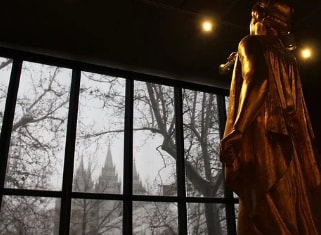 But notice that President Nelson didn't say we hear the Savior as we hear His servants. No, he said we hear the Savior when we heed His servants. To heed means more than just to hear. President Nelson also used the word hearken. He observed that "the very first word in the Doctrine and Covenants is hearken" and then defined hearken to mean "to listen with the intent to obey" before declaring
I like that idea of being more intentional about hearing the Lord. Making conscious choices and acting with intention is key to unlocking much of the joy that surrounds us every day. Our best life comes to us not be accident but by design when act with the intention to have it. Likewise, we hear the Lord more clearly when we act with the intention of hearing it. Listening with that desire to obey whatever we receive is key to having that right and proper intention. Heed  Of course, listening with the desire to obey makes the next step obvious once we actually do hear. We must obey and heed what we have heard. We must apply our newly acquired knowledge. We must act and obtain the results possible only through action. President Nelson was quite clear what some of those results would be.
I don't think I've ever been more eager for Conference to arrive than I am after experiencing what 2020 has offered. And a good portion of that eagerness comes from faith that hearing, hearkening to, and heeding the Lord's voice as spoken through His anointed servants will bring the blessings President Nelson has promised and so much more. And that will bring us more joy in our journey.
Of course, Nephi is a key clue indicating direct applicability to singles. After all, Nephi was a stud of a single adult. Many of the epic faith-promoting stories about him — "I will go and do," for instance, or retrieving the plates from Jerusalem, or the vision of the tree of life — were realized while Nephi was a faithful single adult. What inspiration has lit the world from that valiant example! We LDS singles can foster a similar influence for good if we will do as Nephi did and look to the Savior. Look to Him  That's exactly where Elder McCune's remarks went. Addressing the general Church membership and not just the singles, Elder McCune admonishes all of us to exercise faith despite our challenges. As we look to the Savior in those moments, we can feel the love and peace only He can offer. Elder McCune shares a family experience after his son encountered a life-threatening accident to his brain. In an almost empty hospital, all Elder McCune and his family could do was kneel and pour out their hearts to God. "In the midst of this confusing and painful moment," Elder McCune recounts, "we were filled with our Heavenly Father’s love and peace." Elder McCune continues,
Many LDS singles sometimes wonder whether the challenges of singles life will ever end. To those with such thoughts, I invite you to look to the Savior and walk in faith. Follow His servants  Walking by faith isn't easy. Especially in these times when the pandemic has turned the world upside down, many seem intent on walking in fear. We who have the light of the gospel can inspire faith with a focus on the Savior. And we LDS singles can play that part in our day just as Nephi did in his. Already in my new calling, I've participated in discussions regarding the return to weekly Sunday church services. Many of the Saints have concerns — and rightly so — about the risks of infection. Yet the Brethren have asked local leaders to accelerate the return to regular worship services. Keep in mind the Church is greatly exceeding what local state and county officials recommend. Yet even with that, many members resist the idea of meeting together. Far be it from me to judge others in these trying times. I certainly don't blame anyone for wanting to stay away. Yet I would invite these same people I hesitate to judge to look to the Savior and follow His servants in faith. Elder McCune spoke of the support we can find in focusing on and following the Savior.
Nephi was able to do difficult things because he focused on the Savior and walked in faith. As we focus on the Savior and walk in faith, so can we. Walk in faith  Elder McCune concluded his remarks by addressing the enticements some may experience to leave the spiritual safety of the Church. He first mentions loved ones "who are questioning truth." We don't want to abandon the gospel but also don't want our families torn apart. I can't really speak from personal experience here, but I do like how Elder McCune responded. He advocated looking to the Savior and remaining faithful to Him and His gospel. It's hard to lift someone to higher ground from below. As Elder McCune declared, "If our true desire is to rescue those we love, we ourselves must stay firmly with Christ by embracing His Church and the fulness of His gospel." He then addressed those who think we don't really need the Church.
I too bear witness that we singles Latter-day Saints can do difficult things when we look to the Savior, focus on following Him, and walk in faith. It's not easy, but it was never meant to be, because it was meant to be worthwhile. When we look to Him, the Savior's peace and love can fill our souls. And that will bring us more joy in our journey.
I started my scripture study on scripture study last week. And while I’m nowhere near finished, I found a verse that exemplifies the role I want my daily scripture study to play. It’s inside a very simple formula for peace in life:
Learn  The scriptures are an obvious repository of knowledge about the Prince of Peace. And while they aren’t the only repository, the scriptures should be the first resource we consult when our peace in life is challenged. That’s part of what I want daily scripture study to provide. I want to feel my knowledge and intellectual mastery of gospel principles expanding. I want to feel spiritually nourished. That doesn’t happen for me with a simple rote reading activity because I’ve progressed beyond satiation with simply milk. I need meat! And the scriptures have lots of meat, particularly for those willing to search for it, because many of the golden treasures in the scriptures aren’t lying on the surface for just anyone to pick up. To get the gold, you have to dig. And digging means interacting with the scriptures in one way or another. Those in educational circles would call this active learning. You’re reflecting on the meaning of words or looking for patterns or identifying themes or making connections between different verses based on their use of the same word or pattern, often with the purpose of answering a question or accomplishing some objective. Listen  Of course, peace in life requires more than increasing our intellectual mastery of the gospel. Study does provides the foundation, but the foundation is not the entire edifice. Knowledge is not power; power comes only when we act on our knowledge. To build on the foundation scripture study should provide, we must listen to what we learn. To listen means simply to hear, but it also means to follow and to comply with. And if the Spirit is the true teacher, as is often said, then the real learning comes as we hear the voice of the Spirit and follow what that voice tells us to do. After all, true comprehension comes by doing. I take all this to mean I need to incorporate time for listening into my scripture study ritual. After all, hearing and receiving instructions requires time. My focus cannot be checking off the box next to this daily ritual appearing on my to-do list. After all, your focus determines your reality. My focus must be on acquiring the information the Spirit conveys to those who listen. Walk  That brings us to the third element in the peace formula — “walk in the meekness of my Spirit.” I understand this phrase to mean more than simply following instructions. It means incorporating truth into one’s lifestyle. The ultimate purpose in gaining mastery of gospel principles is to deepen discipleship, to become a more effective servant of the Prince of Peace Who we have covenanted to serve. And the promise to those who follow this three-step process of learning, listening, and walking is peace in Christ. What a wonderful promise! For me, the best part is it’s not conditioned on marital status. We LDS singles can have peace in the midst of our challenges. It all starts with a solid scripture study ritual, then continues with sensitivity to the Spirit and adopting the truth we learn into our lifestyles. You might say peace comes from scriptures, Spirit, and assimilation. Obtaining peace from the Prince of Peace won’t necessarily eliminate our troubles. But it will help us to approach them with confidence and faith that all is in the hands of a loving Heavenly Father. And that will bring us more joy in our journey.
Over the years I’ve occasionally heard LDS singles complain that the Brethren don’t address singles and singles issues very often in Conference. I strongly disagree. True, they don’t always package their content with wrappings identifying their offerings “For Singles.” But if you dig a little deeper and really think about what’s being said, you can find many messages in every Conference that apply to singles. Such are President Ballard’s remarks. By digging a little deeper, we can find messages that apply to singles. And they all center around the idea of giving control to the spirit over the body. Remember God’s plan  President Ballard began by reminiscing over the previous year and his Conference address in October 2018 about the 100th anniversary of Joseph F. Smith’s vision of the spirit world. Note that was October 1918. At that time, war on an unprecedented scale had ravaged the globe for the previous four years, resulting in tens of millions of deaths. And the Spanish flu pandemic was sweeping the globe, driving the death toll even higher. In fact, October 1918 was the deadliest month of the entire pandemic. It truly looked like the end of days. That’s where President Smith’s vision of the spiritual world so beautifully provides hope. This same hope President Ballard expressed in his most recent Conference address. Our Heavenly Father has an eternal plan for His children — that’s all of us living here on this planet as well as everyone who ever lived or will live on it. That plan provides for reunion — that’s the word President Ballard used — uniting generations of family members together forever. Treasure family now 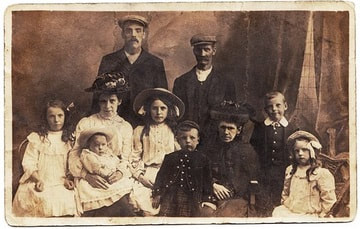 What strength and comfort that hope provides! Though death is certain for all and death from COVID-19 is possible for many, God has prepared a way for us to be reunited with those we love most. He has also provided opportunities for us to treasure those relationships before death. Spending more time sequestered at home provides more opportunities for families to strengthen those treasured relationships. And don’t think that doesn’t apply to singles without families of their own. The only thing stopping us from reaching out to family during this time is ourselves. President Ballard pleaded,
But there’s a caveat: We don’t get a family reunion just because we have love for them. God is as just and orderly as He is merciful and loving. He cannot deny justice when it has its claim (Alma 42:22-25). But President Ballard quotes President Gordon B. Hinckley who tells how we can claim the family reunion we’ll surely seek on the other side of the veil.
Marrying right means marriage for time and all eternity in the house of the Lord. Living right is an entirely different matter. Whereas marrying right takes place within a single day, living right takes place every day over an entire lifetime. And while singles by definition haven’t married right (because they aren’t now married), singles can strive every day to live right. Live right  How did President Ballard approach living right? He referenced a talk his grandfather, Elder Melvin J. Ballard, gave entitled “Struggle for the Soul.” In that talk, Elder Ballard addressed “the ongoing battle between our physical bodies and our physical spirits.” President Ballard then summarized his grandfather’s talk in one sentence: “The primary battle is between our divine and spiritual nature and the carnal natural man.” How is that battle going for you? That’s the question President Ballard asked. And in considering how we each might answer that question, he provided some added perspective. He recognized our spirits have existed long before our physical bodies and that we’ve already made righteous choices before entering mortality — what President Ballard called “a proven track record of a successful spiritual nature and eternal destiny.” He then shared these thoughts:
Living right is really about choosing the spirit over the body. And that’s a choice all of us — single or married — can make every day. We can also choose to strengthen treasured relationships now. And when we do, that will bring us more joy in our journey.
This is a common plight among singles groups everywhere, especially in areas where Latter-day Saints form a small proportion of the population. There is a solution to this dilemma, but it’s not very common. First, we need to ask ourselves, “What exactly are we trying to accomplish? How are we defining success?” Once we have that definition, we need to evaluate it, because our definition of success may not be the one we need to have. With the right definition of success in play, your next steps are developing a vision and then aligning everyone with that vision. Many singles programs falter because they have the wrong vision or no vision at all. And you can’t rally anyone around a vision that either doesn’t work or doesn’t exist. How do these steps typically play out? Let’s examine that. Define your success  I’ve got a few years experience as both a ward and stake single adult rep, so I’ve sat in plenty of those meetings where activities and singles issues are discussed. I’ve also shared experiences with numerous singles groups leaders at conferences. One pattern I’ve found is the typical definition of success. Most singles leaders define success by attendance; the more people who come, the more successful the activity. But what’s really going on here? Does a bigger number really mean more success? In my experience, bigger numbers are simply a bigger stroke to the ego of those who organized and sponsored the activity. That doesn’t really help anyone live a better life. If we can put our egos aside, we can more easily recognize that the Savior focused on only one number: the number one. He was always concerned about the individual. In fact, most of the stories we have of Him ministering to others involves His interaction with an individual person. If we define success in terms of touching or improving the life of at least one individual, then it doesn’t matter how many people attend. Success will always be within our grasp. And paradoxically, it lays the foundation for explosive growth in the numbers. Develop your vision  In Proverbs 29:18 we read, “Where there is no vision, the people perish.” That’s just as true for singles groups as it is for anyone else. Typically, LDS singles attend activities with one of two visions — the dating forum or the activity club. I’ve spoken about each of these at length in previous posts, but here’s a brief review. The dating forum perspective sees singles activities solely as a means to find an eternal companion. If they don’t see anyone they want to date, people don’t attend. Then there’s the activity club. This is the group that’s tired of dating and just wants to have fun with friends. The problem with both of these approaches is their inward focus. Singles with either of these perspectives invariably focus on serving themselves. Contrast that with the more effective approach of the support network — attending activities with the purpose of supporting other singles. That outward focus aligns much better with the path of discipleship our Savior marked. When everyone adopts the attitude of the support network, people feel they’re part of something bigger than themselves. They have a contribution to make that can improve the life of someone else. And losing themselves in service, they find themselves enjoying life a lot more. Build the network  What I’m describing won’t happen overnight. That’s because it’s not some quick-fix, fly-by-night fairy dust. This is a real solution that really works. While I lived on the East Coast, our activity attendance increased by 10X in one year. But more important than that, our exchanges with each other were more real. We were genuinely concerned about each other, despite coming from different generations and backgrounds. Our activities weren’t about completing a calendar or checking a box on a to-do list. Rather our activities were about supporting LDS singles. That’s the driver behind real growth — love. People respond to love. Feeling loved is one of our most deeply seated needs as individual children of God. When you love the people into a support network, they’ll join you. The dating forum and the activity club make very poor primary drivers behind participation. We best help ourselves and everyone else when we discard our individual agendas for attending singles activities. People have needs. When we align what we do with meeting the needs of the people, we’ll find the true success that the Savior marked. And that will bring more joy in our journey.
|
Author
Howdy! I'm Lance, host of Joy in the Journey Radio. I've been blogging about LDS singles life since 2012, and since 2018 I've been producing a weekly Internet radio show and podcast to help LDS singles have more joy in their journey and bring all Latter-day Saints together. Let's engage a conversation that will increase the faith of LDS singles and bring singles and marrieds together in a true unity of the faith.
Comment
Joy in the Journey Radio encourages the free discussion of ideas but reserves the right to remove and/or block comments which do not conform to LDS standards.
Donate
Joy in the Journey Radio offers many free resources to help LDS singles everywhere, but it certainly isn't free! Help Joy in the Journey Radio in its mission to improve the lives of LDS singles by donating today.
Posts by Month
December 2022
Categories
All
|
|||||||||||||||||||||||||||||||||||||||||||||||||||||||||||||||||||||||||||||||||||||






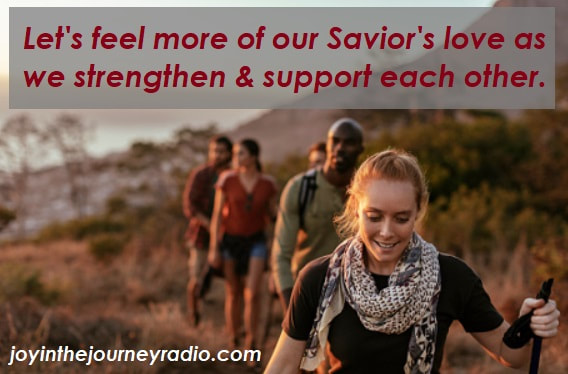




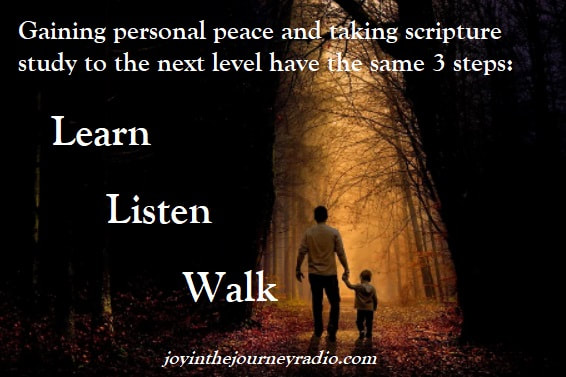



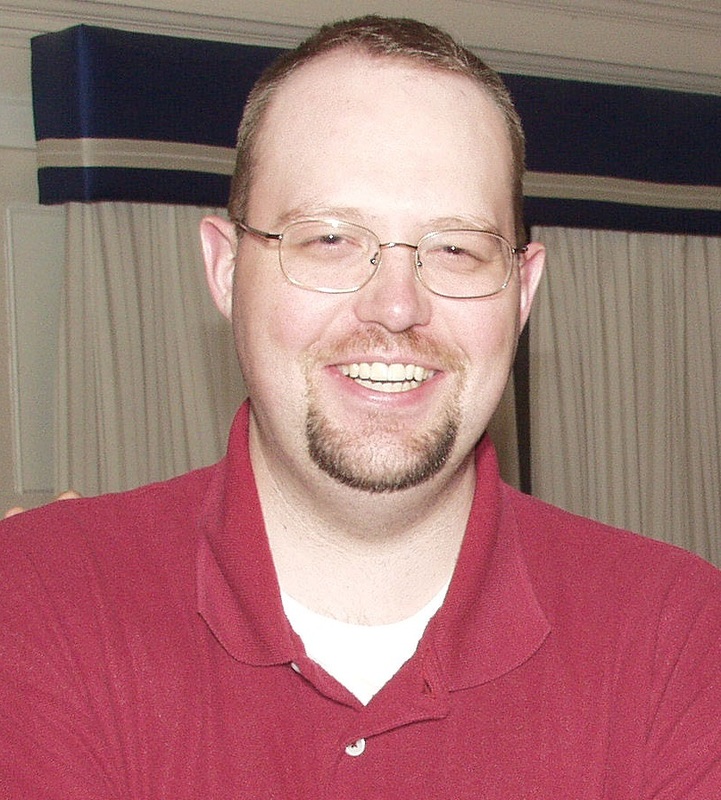
 RSS Feed
RSS Feed